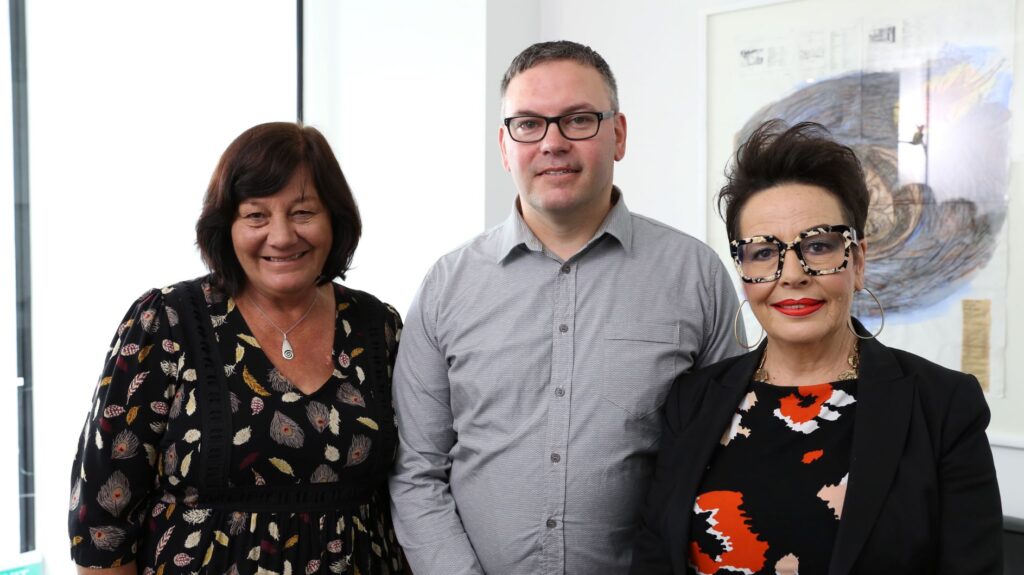
From left to right: Jude Pauling (MySkill Learning and Development Team Leader) Dion Woodfield (MySkill Learner and Support Worker), Amanda Nicolle (Ministry of Social Development Director Industry Partnership)
A growing demand for skilled people to care for New Zealand’s aging population is providing job opportunities and new careers for people who have lost their jobs because of COVID-19.
According to stats.govt.nz, 25,000 Kiwis lost their jobs in the December 2020 quarter; 15,000 were women. Māori, Pacific Island and older women were most affected by COVID job losses. And, despite the unemployment rate decreasing to 4.9% in the December 2020 quarter, women have continued to be over-represented with an unemployment rate of 5.4% (compared with 4.5% for men).
General Manager of the training provider MySkill, Anita Guthrie says: “While job-loss is a devastating side-effect of COVID, it does present an opportunity for the healthcare industry to train and employ these women who are now looking for a new job.”
“MySkill offers a free online Community Health course with NZQA Unit Standards, which is a great stepping-stone into a rewarding job with career progression potential in the healthcare sector.”
Entry level jobs start with a support worker role and then ongoing training can lead to other careers in the healthcare sector, including nursing, physiotherapy and occupational therapy.
And it isn’t only women seeking a career change. Men are also taking up the training opportunity and Dion Woodfield was the person who marked the milestone of being the 100th person that we have placed into employment.
“It’s helped me get into a career that I’m really enjoying. What I really like about it is the ability to learn at my own pace, it’s simple to work through and understand,” Dion says.
“The training is very relevant to my daily job and a good foundation to start a role as a support worker. I feel like I’m making a difference in the community and for individuals’ lives.”
New Zealand has an aging population. According to the data from SuperSeniors, as early as 2035, the number of people aged 65 years and over is expected to double to around 1.2 million – nearly 25% of the population. In 20 years, there will be 370,000 people aged over 80 years of age, an increase of 130%, which will put an enormous strain on the health and aged care sector who will be supporting these people.
As New Zealand’s multi-ethnic society has grown, alongside is the need to provide a large and diverse ethnic pool of workers to care for this multi-ethnic aging population made up of predominantly European, Pacific (Samoan, Tongan, Cook Islands, Niuean) and Asian (Chinese, Indian, Filipino, Korean) cultures with the Asian population the fastest growing sector.
The Ministry of Social Development (MSD) is partnering with MySkill to fund the training and help people into a healthcare job that has a pathway.
MSD Industry Partnerships Director, Amanda Nicolle says: “It’s a priority to support New Zealanders into a meaningful career and help boost the sector’s workforce, where there’s a need for skilled workers.”
“We’re finding this training is being seen as a valuable opportunity by people impacted by Covid-19 and at risk of being on a benefit long-term.”
“MySkill is a free online training programme that, enrolled learners can start and complete anytime, any place they want. The programme, designed by healthcare experts in the industry, is easy to use and suitable for people of all ages. Participants are then helped to find a job and they can continue to earn while they learn new skills and work towards upskilling into other great career opportunities in the fast-growing and stable health sector,” says Anita.
If learners need additional support, the MySkill team connects with them via email or phone to provide end-to-end assistance.
General enquires – call 0800 MySkill (0800 697 5455) or email [email protected]
Phone number from Australia – 0011 64 800 697 5455
Employers looking for training – email our Sector Relationship Manager, Jonathan Goodwin [email protected]
Looking for a job? – Go to www.myskill.co.nz/career-opportunities
MySkill is a part of New Zealand Health Group